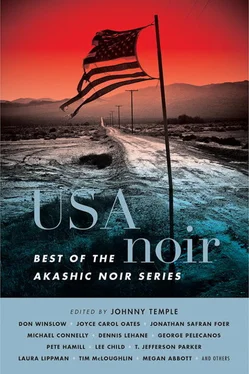Johnny Temple - USA Noir - Best of the Akashic Noir Series
Здесь есть возможность читать онлайн «Johnny Temple - USA Noir - Best of the Akashic Noir Series» весь текст электронной книги совершенно бесплатно (целиком полную версию без сокращений). В некоторых случаях можно слушать аудио, скачать через торрент в формате fb2 и присутствует краткое содержание. Город: New York, Год выпуска: 2013, ISBN: 2013, Издательство: Akashic Books, Жанр: Триллер, Детектив, на английском языке. Описание произведения, (предисловие) а так же отзывы посетителей доступны на портале библиотеки ЛибКат.
- Название:USA Noir: Best of the Akashic Noir Series
- Автор:
- Издательство:Akashic Books
- Жанр:
- Год:2013
- Город:New York
- ISBN:978-1-61775-189-9
- Рейтинг книги:3 / 5. Голосов: 1
-
Избранное:Добавить в избранное
- Отзывы:
-
Ваша оценка:
- 60
- 1
- 2
- 3
- 4
- 5
USA Noir: Best of the Akashic Noir Series: краткое содержание, описание и аннотация
Предлагаем к чтению аннотацию, описание, краткое содержание или предисловие (зависит от того, что написал сам автор книги «USA Noir: Best of the Akashic Noir Series»). Если вы не нашли необходимую информацию о книге — напишите в комментариях, мы постараемся отыскать её.
USA Noir: Best of the Akashic Noir Series — читать онлайн бесплатно полную книгу (весь текст) целиком
Ниже представлен текст книги, разбитый по страницам. Система сохранения места последней прочитанной страницы, позволяет с удобством читать онлайн бесплатно книгу «USA Noir: Best of the Akashic Noir Series», без необходимости каждый раз заново искать на чём Вы остановились. Поставьте закладку, и сможете в любой момент перейти на страницу, на которой закончили чтение.
Интервал:
Закладка:
He’d told me that he’d broken his arm in a car accident, pursuing two black kids who had robbed a jewelry store.
As I released the strips of paper through the sewer gratings, I thought of the hand in the subway tunnel, and my father’s assertion that there were many body parts undoubtedly littering the less frequently traveled parts of the city. Arms, legs, heads, torsos; and perhaps all these bits of photo would find their way into disembodied hands. A dozen or more hands, each gripping a strip of photograph down in the wet slime under the street. Regaining a history, a past, that they lost when they were dismembered, making a connection that I never would.
CRAZY FOR YOU
by Barbara Demarco-Barrett
When I moved into Levi’s apartment in the converted motel on Placentia Avenue, the blue neon “i” of the Placent_a Arms sign was burned out. I worried it was an omen, a feng shui gaffe. It made me think too damn much of placenta, birthing, that whole entire mess—not a good thing when the sight of blood makes you faint. I’ve grown used to most things, and I figured I’d grow used to the sign, if I didn’t leave Levi or go crazy first. But I hadn’t grown used to it, and I was still here. It was going on three months and my feeling of foreboding had only increased.
The Arms, a chipping aqua U-shaped construction, was clean enough, but Levi’s apartment above the fray on the second story, right-hand corner, was growing smaller and duller by the day. So was Westside Costa Mesa, once idyllic cattle grazing land, then an agricultural haven. Now, about the only things that grew wildly were the illegal immigrant population, low-income housing, and Latino gangs. So different from where I was from. If I spoke the language it might be different, or if I was brunette. But I was blond, the only gringa in our apartment complex.
I pulled a folding chair onto the balcony and lit a hand-rolled cigarette, the only tobacco I could afford these days. In the Arms’ courtyard just below sat a square swimming pool that had seen better days. Sorry little children with loser parents—why else would they be living at the Placent_a Arms?—splashed in its murky depths. Even the mourning doves inhabiting the adjacent kumquat tree seemed weary of the pool, but then Southern California was mired in a ubiquitous drought and the pool must’ve been better than nothing, I suppose. Although you can make yourself believe pretty much anything if your life depends on it.
At night, after a drink or two, as you watched the lights beneath the water, all blue and tropical, it was easy to trick yourself into thinking you were at some lush Orange County resort and were one of the beautiful people. The reverie never lasted long, though, because one drunk resident or another would start singing off-key—Barry Manilow, Aerosmith, pop Latino—reminding you that you were not in posh Newport Beach, the next city over, or in Laguna Beach, just down the coast, but in lovely Costa Misery. My sister Leonora, a nurse, left home back east to work for a plastic surgeon—the perks included discounted enhancements —and I followed when I quit my teaching job, all because of Levi.
Levi was sixteen when we met, seventeen when we started spending time together—backstage, on the football field, in cars. I was Levi’s drama teacher, thirty-three years old, but young-looking for my age. My friends called him jailbait, this sleek pretty boy with sea-foam green eyes and abs to die for. I lusted after the kid, but when my soon-to-be-ex husband caught us in my car in the parking lot outside Bob’s Big Boy and threatened to have me fired, I decided I needed my job teaching more than I needed Levi, resigned, and moved here. I saw what happened to other teachers who crossed the line, who forgot they were teachers and not teenagers.
A year later, when Levi turned eighteen, he quit school and found me. He was of age, but still too young for me. I was still living with Leonora and her three dogs, substitute teaching in Costa Misery, along bus routes. The trip cross-country had killed my beater and I let my driver’s license expire. The better school districts never seemed to have an opening and I didn’t want a full-time gig at just any school. Levi had already rented the furnished apartment at the Arms and I planned on spending just a few days, thinking this would help to get him out of my system. But he guilt-tripped me into moving in, said he wouldn’t even be out here if not for me.
“Mimi, the guy’s a loser,” Leonora said. “You can do better.” But I was addicted to Levi’s body, his skin that felt like silk, and tired of being one of Leonora’s pack.
My stomach growled. I lit another cigarette and looked at my watch. Five o’clock. Levi would be home soon. I went inside to throw something together for dinner.
Levi worked as a handyman. Ten bucks an hour, sometimes more. Not what he thought he was worth, but it paid the rent, bought the beer. He told me stories about the rich people’s houses where he spent his days—brushing the walls of a nursery with designer paint or retiling a hot tub. He described how, at one home, the outdoor pool connected with the interior of the house through a manmade cave with faux boulders you had to swim through. So Orange County.
Another client owned two houses side by side—one of them they lived in and the other one was the kids’ playhouse. Playhouse! Homeless people lined up at church soup kitchens and lived in parks and alleys around the town. Life was indeed unfair. And I was a little envious. Some people in Orange County had too much, while others had so damn little.
On the west side, everyone—the Latinos, the working-class heroes, even the dogs—was, for the most part, lackluster. There were artists who added color, I suppose, but every day I read the police files in the Daily Pilot , and so much of the crime in coastal Orange County happened right around where I lived. Here were the factories, auto shops, taquerías, and lavanderias, and so many of us were scraping by, but on the east side that bordered Newport Beach, that’s where the real money was, that’s where the Orange County life that I had imagined and fantasized about resided. I’d been to Disneyland but never got why they called it the Happiest Place on Earth, not with all those screaming children and tourists with blue-white legs and lunky cameras strangling their necks. But a house on the east side, now that would make for a happy day, every day.
Levi came home from installing shelves in what he said looked like the kitchen of a TV cooking show: marble—not granite—countertops, Viking stovetop, a fridge the size of our bathroom. He rambled on about how the homeowner didn’t even have a wife. I was standing at the stove, stirring Arborio rice, adding vegetable broth every few minutes, to make risotto. What you pay for at a restaurant when you order risotto is not the ingredients, but the time it takes for some sadly underpaid restaurant worker to make the rice swell all plumplike. Biscuits, which I had flattened with my marble pastry roller—my most prized kitchen implement—and baked in the dollhouse-sized oven with a stovetop that only had three working burners, were cooling on the rack.
Levi could see I was down, so he kissed my cheek hard and wrapped his arms around me from behind. After a day among kids who treat substitute teachers like dog doo, Levi’s touch was heaven. He snaked his hand beneath my skirt and found my sweet spot. I wanted to shoo him away—you can’t leave risotto for one minute —but once Levi got on a certain track, there was no stopping him.
Читать дальшеИнтервал:
Закладка:
Похожие книги на «USA Noir: Best of the Akashic Noir Series»
Представляем Вашему вниманию похожие книги на «USA Noir: Best of the Akashic Noir Series» списком для выбора. Мы отобрали схожую по названию и смыслу литературу в надежде предоставить читателям больше вариантов отыскать новые, интересные, ещё непрочитанные произведения.
Обсуждение, отзывы о книге «USA Noir: Best of the Akashic Noir Series» и просто собственные мнения читателей. Оставьте ваши комментарии, напишите, что Вы думаете о произведении, его смысле или главных героях. Укажите что конкретно понравилось, а что нет, и почему Вы так считаете.












